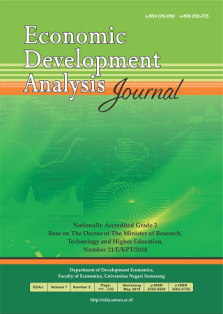The Economic Impact of the Induction Stove Conversion Program in Indonesia
Abstract
The Indonesian government has been facing problems related to LPG subsidies for households, domestic supply shortages, and electricity oversupply for nine years. Increasing LPG stoves to induction stoves is an alternative policy to overcome these problems. The research was conducted by calculating the net benefits households, the government, and companies received due to the conversion of LPG stoves to induction cookers. Then, it becomes a stimulus for the national economy, calculated through input-output analysis. Calculations are made based on two program scenarios: the conversion of households receiving electricity and gas subsidies (scenario I) and soft selling schemes (scenario II) from 2023 – 2030. The analysis shows that households participating in the program can save energy expenditure between IDR 260,011 – IDR 2,163,452, energy subsidies of IDR 22.65 trillion, and imports of 10% - 18.90% per year. The impact of the national economy in scenario I through input-output analysis creates a GDP of IDR 71.01 trillion and a labour income of IDR 21.88 trillion. Meanwhile, scenario II creates a GDP of IDR 52.85 trillion and a labour income of IDR 19.76 trillion. The soft selling scheme minimizes government costs and significantly impacts the national economy so that it can be implemented as a national program.


